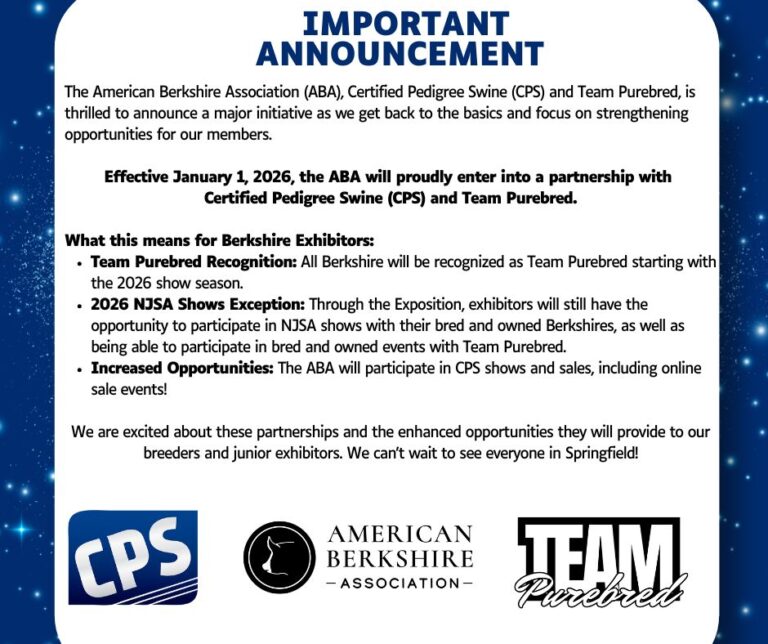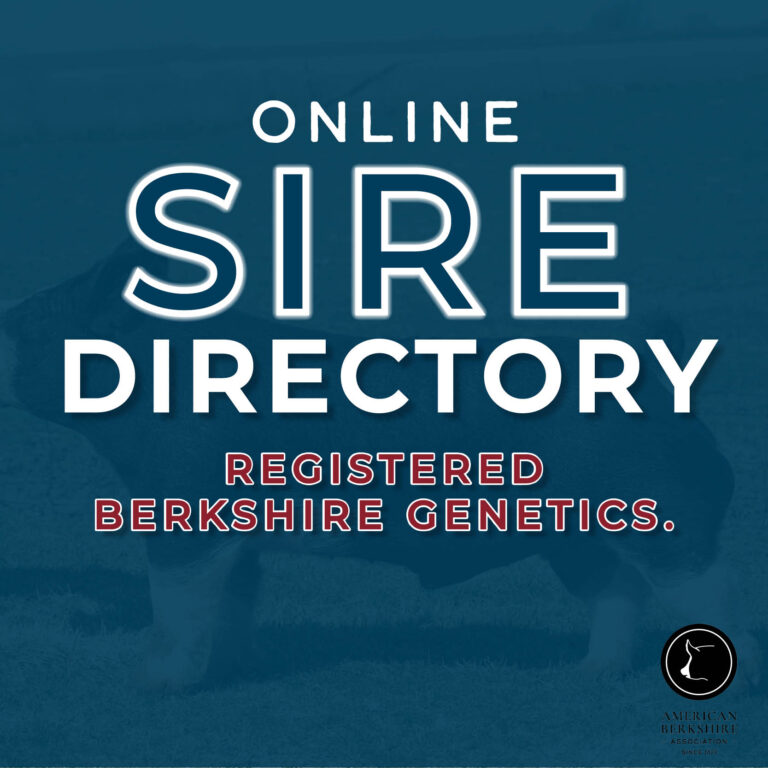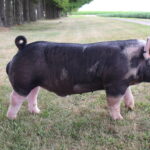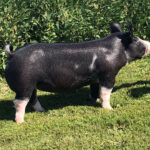From August 1947 The Berkshire News: Charles F. Curtiss by C.W. Mitchell
Shared on behalf of Patterson's Registered Berkshires
Ph: 540-649-5759 | redmill@newhopetel.net
www.pattersonberkshires.com
One of the world's great agricultural authorities and educators departed this life Wednesday, July 30th. Charles F. Curtiss, Dean Emeritus of Agriculture of Iowa State College since 1934, Dean of Agriculture and Director of the Iowa State College Experiment Station for some 40 years, and founding father of the School of Agriculture at Iowa State, died following a prolonged illness at his home on the Campus at the age of 83. He was born at Nora (near Warren) Illinois on December 12, 1863.
Dean Curtiss was known and respected throughout the world. He was not only personally familiar all things agricultural in his adopted state of Iowa, but the whole United States and the North American Continent. He traveled extensively in England and throughout Europe. Through his extensive studies and contacts throughout the remainder of the world he made himself familiar with all things pertaining to farming.
No greater demonstration of the world renown status of Charles F. Curtiss could be sighted than the day of his retirement from active service as head of the College of Agriculture at Iowa State on June 11, 1934. It was my pleasure and honor to represent the American Berkshire Association on that memorable occasion. His forthcoming retirement had been announced, and letters of congratulation and comment on his great work poured in. As they accumulated it was thought to bind them into a volume, which rapidly grew to three. A banquet in his honor was scheduled by the Alumni association, and it too grew in proportions, until the Union Building on campus overflowed and representatives from some two score nations of the world attended.
However, the work of the great Dean was not solely confined to his College and experiment station. He was one of the founders of and lifetime director of the International Livestock Exposition. He was a farmer. The fame of his Rookwood Farm extended into many foreign countries through the exportation of animals bred and raised there.
Rookwood was one of the great livestock breeding establishments of its day - which spread over nearly 40 years. Its Percheron horses and Shorthorn cattle were well and favorably known with many champions to their credit. However, perhaps his Berkshire hogs were even more widely known as is evidence by the fact that a summary of the champions at Palermo in the Argentine in the current issue of their livestock magazine in that country showed about a third of their champions over that period carrying Rookwood breeding.
Dean Curtiss was a great believer in Berkshires to the last. Perhaps no man was ever more sold on the merits and ultimate future of the breed than the great Dean. Probably no man had a greater appreciation of the supreme carcass qualities of the breed, and the ultimate need for just that type of hog on American farms.
VISITED HIM JUNE 16TH
The last time I saw Dean Curtiss was on June 16th this year- the day following the picnic at Ames. In 1944 was the last year his health permitted him to attend the Iowa Berkshire breeders' picnics. His herd had been dispersed, but his interest in the breed and its affairs remained. When I saw him this June he was able to be out on the front porch of his campus home in the care of a nurse. Altho exceedingly frail of body, his mind was still sharp and interested in the affairs of the breed to which he had devoted so many years. He was much concerned over the crop and weather conditions, and keenly aware of the problems of the day.
The Dean was a great character. Ever since it was my pleasure to know him, he was a model of dignity and poise. I saw him once walking down "Peacock Alley" in the Congress Hotel in Chicago. Erect. Perfectly tailored. His stride firm and graceful. His gold headed cane in his hand. A thoroughbred every inch of the way in a perfect settings. I have never forgotten the picture he made.
Likewise I have never forgotten a visit to the campus only seven or eight years ago. The Dean proposed that we should go out to Rookwood. I offered to use my car, but he wanted to use his. And so, we walked over to his house adjacent to Ag Hall and backed out his Ford convertible. With the top down and his cigarette at a cocky angle the Dean set new sped records for the Campus as we cut a swath out to the famous breeding establishment.
ASSOCIATION PRESIDENT 9 YEARS
The Dean purchased his first Berkshire from the Iowa State College of March 14th, 1906. (It is significant that he had built up that kind of a herd at the college before he started breeding them for himself.) In 1908 he was elected to the Board of Directors of the American Berkshire Association, a position he held until 1936 when he was succeeded by Carl A. Henkle. In 1910 he succeeded J.W. Martin of Gotham, Wisconsin to the Presidency of the Association. He was successively re-elected to this post for nine years, when he was followed in 1920 by J.E. Dodge who in turn was followed in 1921 by W.S. Corsa.
The founding herd sire at Rookwood was Rookwood Rival 115050. He was by Lord Premier's Rival 92805. He was bred by I.L. Weirick of Cowden, Illinois being sold in dam to Kinlock Farm of Kirksville, Missouri. The Dean purchased him as a weanling pig.
The next great herd sire to come from Rookwood was Rival Champion's Best 127963. He was by Rival's Champion 112500 by Lord Premier's Rival. He in turn sired the next great Rookwood herd sire, Laurel Champion, 166263, who begot Laurel Champion's Best 263839. He in turn sired Laurel Leader 314000, who was the foundation sire of Rookwood Leaders.
Laurel Champion was also the sire of Real Type 240672, the famous herd sire in the E.J. Barker herd and Grand Champion at the National Swine Show in 1923. He likewise sired the famous Laurel Epoch 291100 who sired Bigfellow 313726, who sired Rumford Duke 84th 323390, the sire of Advancer 328898, the sire of Epoch Advancer 336217, the fountain head of modern "Epochs." Therefore we see that a very high percentage of modern Berkshires find their paths leading back through the pastures of the famous breeding establishment adjacent to Iowa State College.
The next great herd boar to make his home at Rookwood was the 1931 National Grand Champion, Border Raider, purchased as a pig farm from Hartley Stock Farm of Page, North Dakota. He was followed by Eliminator's Ideal 7th, the 1939 Iowa Grand Champion who was purchased as a pig from E.B. Moore of Westfield, Indiana. He in turn sired the 1941 Iowa Grand Champion, Rookwood Ideal 12th, the last great champion bred at Rookwood.\
With failing health overtaking him, Dean Charles F. Curtiss began to reduce his herds and flocks in '42 and '43. The Berkshires at Rookwood were closed out when the great herd sired and brood sows were sold to Mrs. Annetta Woods and Lewis O. Nichols of Webster City, Iowa.
With the passing of Dean Curtiss a man is gone who probably did more to build and uphold the the dignity of farming and livestock breeding than any other man. His it the man, above all others, who brought the public to look with respect upon the agricultural college and its professors. It is very fitting and proper that the great Agricultural Hall on the Campus at Ames, built in 1909 and in which he labored for so many years, should be renamed in his honor as recently announced.
Check out The Berkshire News: The Breeder 2021.





